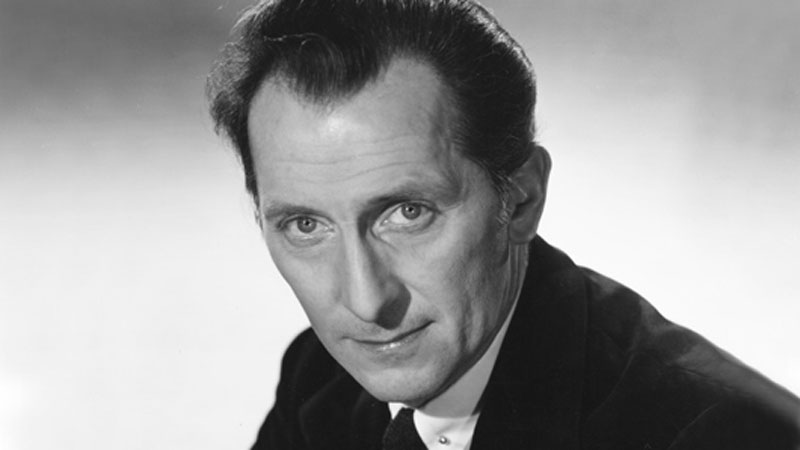HOWARD JACKSON says two words sum up Peter Cushing – Obedience and Disappointment – in this profile of the horror film legend…

The name is important, a present participle based on a verb that does not exist. The name helped a career in horror but may have limited opportunities elsewhere. The name Cushing implies something that might happen in the dark and an encounter that could leave an unpleasant aftertaste. In the 1958 version of Dracula only the name of Peter Cushing appears above the title of the film. The dramatic music helps but both names in the credits suggest horror.
Peter Cushing had regular work as an actor all his life. He had starring roles in 23 horror films for Hammer but there were also another 60 films and, as well as that, TV work which included a series as Sherlock Holmes. Benedict Cumberbach has a long way to go. Perhaps the most memorable role of Peter Cushing was in the BBC 1954 production of the less than accomplished but still memorable George Orwell novel, 1984. Orwell stole the idea from the much superior We by Russian author, V S Zamyatin. Thin and charisma free, Cushing was perfect as Winston Smith, the deceived and oppressed citizen of a totalitarian British State. Smith is how the English used to be, obedient, dissatisfied and disappointed. Cushing had the same spirit, and so did Alec Guinness.
Peter Cushing was not an equal talent to Guinness who had a wider range and was more inventive and subtle. Guinness was not obliged to have a career dominated by horror movies. The comparison, though, is not irresponsible. Cushing was always convincing in the role of the formal Englishman or his European equivalent. He may not have been as creative as Guinness but no one doubted that he was authentic. There is a moment in the film Dracula when the maid unwittingly suggests that the vampire might be in the cellar. The startled reaction and leap to action by Cushing is inspired and transforms contrived narrative into something memorable. This moment alone would justify an acting career.
‘Leap to action by Peter Cushing is inspired’
Peter Cushing was not a handsome man. He looked like a schoolteacher that would struggle to hold the attention of the children. Clothes did not flatter his frame but they were flattered by him. Cushing had the look of those women with strange faces who tread the catwalks. And his face was memorable. Framed by a luxuriant widows peak the face was thin and bony. Below his eyes there were caverns where cheeks should have been. This is what we expect the traumatised to look like. With Cushing no one doubted that the trauma had existed, and all accepted that whatever it had been it would and should not compromise his impeccable British manners. The contradiction between his troubled expression and assured manner ensured a tension in his performances. Cushing became an icon in British horror for reasons other than ubiquity.
Outside the movies Peter Cushing was a loyal and devoted husband. In his Hammer films his characters had even less sex than a faithful husband. Existing to explain the supernatural and dreadful to the rest of us, they were intellectual snobs and they suffered the consequences. Cushing was great because he never used his intellectual snobbery to sneer. If he became angry with those not as informed as him, it was because he had serious ambition, creating life or ridding the world from apocalyptic evil. The one woman in his life died when he was fifty-eight years old. Cushing admitted that after that ‘the heart went out of me’. He lost weight and the golf ball cheekbones were barely draped in skin. The intense love in his life and the death of his wife obliged Cushing to live a final heartless 23 years. The man continued to work. Like his characters, he fulfilled his destiny as an obedient, dissatisfied and disappointed Englishman. His legacy, though, included some fine performances in memorable films. For more about them later watch this space.


